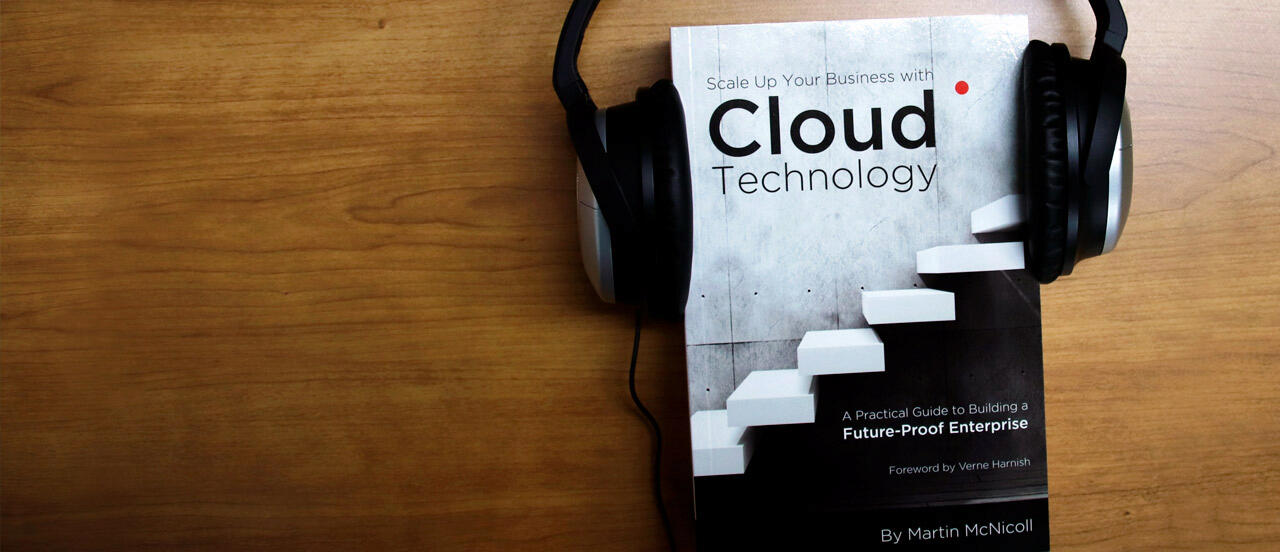
How do you define the Cloud today? In the first episode of his podcast, “The Cloud Today”, Martin McNicoll (Founder & President of GURUS Solutions, North America’s largest NetSuite Services Provider) answers that question - and more! Listen to the podcast below.
What is “The Cloud Today?”
The tech world is constantly changing, with innovation always just around the corner. Are you interested in staying in the loop with the latest technologies and future innovations? Do you want to hear about what’s happening with Silicon Valley tech giants?
In “The Cloud Today,” Martin McNicoll, GURUS CEO and author, speaks with professionals from different business to discuss their journeys of entrepreneurship, the struggles they’ve faced, how they overcame them, and where technology fits in.
We also look at what’s hot in the tech industry today - what are the trends that are making waves in Silicon Valley? What is everyone talking about right now and where are things headed tomorrow and the day after?
“The Cloud Today” is your tech-talk, business know-how, and overall one-stop-shop to geek-out and stay ahead of the curve.

What’s on The Agenda?
With years of experience in the media world, including years of experience at, tech giant, MINDGEEK, John provides a unique perspective on the status quo of Cloud businesses.
Coming from a strong SEO background, and having attended and spoken at countless international media conferences, including Google Dance, John has been an active participant during the evolution of tech media.
The question of this episode is:
Is every business becoming a cloud business?
Martin and John discuss the evolution of the Cloud across different industries and look at what's changed since Martin published his popular guide on everything Cloud, Scaling Up Your Business with Cloud Technologies in 2015. Since then, Martin has been on this journey of understanding how to use and leverage Cloud technology in modern industries.
Soak up some valuable insight into where things are right now, and where things are going in the future, as tech giants like Amazon and Google, continue to revolutionize an already dynamic market.
Watch the first episode when you want it, where you want it, using one of the links below:
The Beginning of the Cloud
Oracle CEO, Mark Hurd, once said, “Every business is a cloud business.” In 2019, this seems to be becoming the case, but the Cloud has not always been as popular as it is today.
In 2005, when Martin McNicoll first began his Cloud ERP implementation business, GURUS Solutions, what we call the Cloud today was previously referred to as an ASP (application service provider).
Two pieces of technology shaped the way we use the Cloud today, and those technologies were still fairly new at the time. The two were high-speed internet and the browser. Those two inventions gave people the ability to have an accessible user interface on any device.
The idea for the Cloud is essentially similar to the way that things used to work in the past. Back then, we would sit at our desks with our computer screen, keyboard, and, if we were lucky, a mouse, and we would pull information from a central hub. Everyone was sitting at their desk, with their own terminal, taking information from this central hub. Essentially, all the information was located in one place.
Unfortunately, this method was limited and only allowed people to work close to that central hub. As a result, we transitioned to using personal computers at our desks. These computers stored our information, but made it difficult to share our information.
The other problem with using a siloed system was that it required a lot of CPU and memory to run, which was not always available at home.
Once we began using data for more and more complex algorithms, the question became: How do we get enough data?
To avoid relying on outdated processors to process these large amounts of information, as we did in the dark ages, we turned to the Cloud. Cloud technology allows us to easily upload, edit, share and manage large amounts of data from a central hub that can be accessed anytime, anywhere.

The Benefits of Being a Cloud Business
John Serino says it clearly and straightforwardly, “At the very core of the Cloud, there is efficiency.”
Many companies may not realize that they need to upgrade their systems until it’s too late, and they’re drowning in overcomplicated processes and mismanaged data. While changing to the Cloud can help your business prepare for the future, it can also help your business manage its present situation.
Whether you’re a large business looking to grow, or a small business looking to improve your processes, you’re still gaining by going to the Cloud because of the efficiency factor.
The Cloud is your central hub for your data. Your departments can be connected, your data can be transparent, and your information can be accessed so that:
- Your accounting is made easier
- Your manufacturing orders are clearer
- Your reports are more transparent
- Your planning and budgeting is simplified
- Your days are shorter
John goes on to say, “You can go on vacation with your family and still look at your data from wherever you are in the world.”
We definitely think you should enjoy your vacation, but just in case you want to check in, you can do it easily and efficiently, before your kids even notice you’re gone.
There is no limit to what the Cloud can do. It’s interesting to think of where it is already, and what more it can and will be able to do.
How The Cloud Can Improve Your Business
Midway through the episode, Martin expresses, “It’s crazy to see how many people still run their businesses on spreadsheets or antiquated systems like Quickbooks.”
CEOs of companies of all different sizes come to Martin and his team with real problems when they’re trying to grow their businesses while using these antiquated systems.
Martin has clients coming to him, in despair, saying “I have to run three versions of Quickbooks because I have a business in Europe, in Canada, and in the U.S, and I’m thinking of opening something in Latin America.”
And the question is: “How can I run all these businesses with one integrated system?”
Martin goes on to say, “Solutions are out there. It’s about taking the lead and telling yourself ‘I’m going to use something else.’”
The Cloud allows you to run your business better, and grow to a different level without having to hire tons of staff to crunch the numbers. Having a system to do the back-office work for you helps you spend less time on the processes, and more time on your actual business.
There are so many cases where scaling up your business is facilitated by scaling up your system. Growth is facilitated by connecting your operations with your finance or having a bird's eye view over your inventory.
You can either:
- Spend your day working
- You can spend some time thinking about the next level of your business
That’s what ERP technology allows you to do.
When Is It Time to Scale Your Business?
Martin shares his advice for growing businesses, saying, “Every business needs to look at their business model and think, ‘How can I do this better?’”
When dealing with a company that may need to upgrade their processes, the first step is understanding where they are now, with questions like:
- How are your processes set up to accommodate new customers?
- How do you measure your sales?
- How do you keep track of your inventory?
- Do you do keep track of your orders?
The next step is understanding where they want to go:
- Where do you want to go with your business?
- What is it that you are trying to achieve?
If you’re struggling to grow my business, or struggling to stay alive, you need to reevaluate your processes. If you’re in survival mode, you’re not focused on implementing new processes. You’re just focused on solving your immediate problem, and trying to keep your head above water.
You need to act before this happens.
You want to be the entrepreneur that has your processes in control but understands that to grow, you have to upgrade your financials before they break.
That’s when you begin thinking about:
- Where are your core problems? (financials, inventory, etc.)
- What is your revenue building machine? How can you automate it?
- How do you recognize the processes that are going to break down first?
For more information, check out the 6 early indicators that your core financial systems need to be upgraded.
Martin shares more advice for his fellow business leaders, saying, “There are tools to help get entrepreneurs to the next level, and the message is they don’t have to do it alone.”
How GURUS Can Help Future Cloud Businesses
GURUS Solutions has been a 5-star NetSuite partner for 8 years running. We are NetSuite experts, offering our clients the best Cloud management software paired with a leading approach to solidifying back-office infrastructures.
How do we differentiate ourselves from the rest of the market?
- A specialized process for optimizing your daily operations with reduced risk.
- 14+ years of experience working with NetSuite and the Cloud.
- 5-Star NetSuite Partner for 8 years in a row.
- A unique & collaborative approach to any project.
- Experience with a vast number of industries.
- Over 2100 successful projects completed.
- Resources across all of North America.
Request More Info From an Expert






